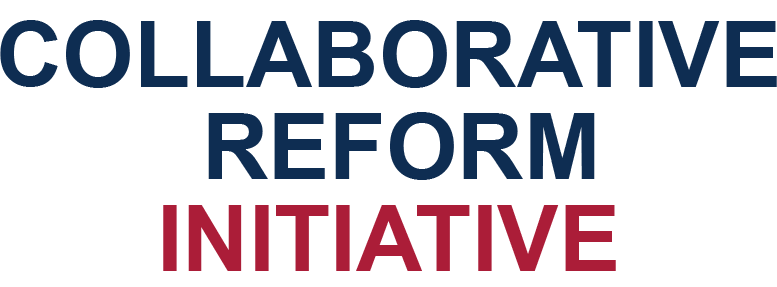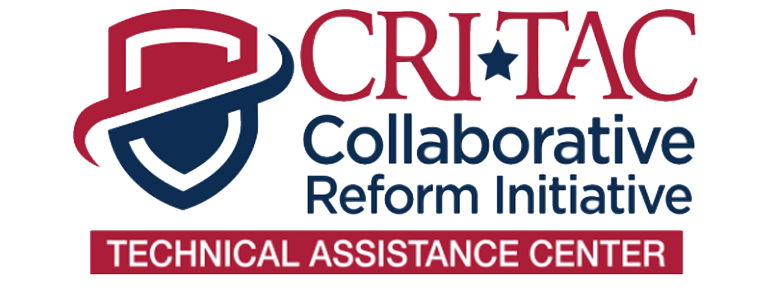
The U.S. Department of Justice (DOJ) is committed to ensuring that law enforcement agencies across the nation serve all people with fair, equitable, and effective public safety practices. To that end, the Office of Community Oriented Policing Services (COPS Office) offers the Collaborative Reform Initiative Continuum of Technical Assistance Services to assist law enforcement agencies and the communities they serve in identifying and implementing organizational improvements and reforms through training, consultation, peer-based learning, analysis, and in-depth assessments.
The COPS Office Collaborative Reform Initiative is structured as a continuum of services offered to law enforcement agencies on a strictly voluntary basis. The three programs along the continuum offer services that range in time and complexity all designed to meet the following goals:
Build trust between police and the communities they serve
Improve fairness, effectiveness, and efficiency in agency operations
Enhance officer safety and wellness
Build agencies’ capacity for organizational learning and self-improvement
Promote community policing practices nationwide
Overview
- Collaborative Reform Initiative Technical Assistance Center (CRI-TAC) offers training and TA on a request-and-deliver basis through a consortium of law enforcement stakeholder associations, subject matter experts (SME), and training providers. These engagements are narrowly scoped and conducted at the pace of the requesting agency.
- The Critical Response program offers an intermediate form of technical assistance that includes issue-specific or after action reviews and reports or targeted assistance in the wake of a critical incident. In contrast to Organizational Assessment, this program does not involve on-going implementation and technical assistance in the long term.
- The Organizational Assessment program offers a more intensive form of technical assistance, involving in-depth assessments and technical assistance on systemic issues that challenge community trust and confidence. These engagements are the most comprehensive.
Although the programs along the continuum are complementary, each serves a distinct level of technical assistance need. Each of the three programs contribute to the prescribed goals by assisting participating law enforcement agencies make small and large-scale improvements and reforms on a proactive, collaborative, and voluntary basis.
Continuum of TA Services
COPS Office Technical Assistance: Historical Recap
-
2022Attorney General Garland announced the revamped Collaborative Reform Initiative. By reestablishing the services of the original Collaborative Reform Initiative and Critical Response program while continuing to sustain technical assistance supported through the CRI-TAC, the COPS Office offers a comprehensive continuum of services to law enforcement agencies nationwide—all under the banner of the COPS Office’s flagship TA program, the Collaborative Reform Initiative.
-
2017 (December)COPS Office established the Collaborative Reform Initiative Technical Assistance Center (CRI-TAC) as a one-stop shop for law enforcement agencies requesting a variety of high quality, tailored training and technical assistance (TA) resources.
-
2017 (September)At the direction of DOJ leadership, the COPS Office ended the Collaborative Reform and its partner Critical Response program. Upon the closure of the programs, the COPS Office initiated 17 Collaborative Reform sites and 13 Critical Response sites.
-
2012COPS Office established the Critical Response program to provide limited assessments of key processes and procedures, as well as rapid technical assistance such as peer exchanges. The Critical Response program operated in parallel with Collaborative Reform and was designed to provide targeted technical assistance to law enforcement agencies dealing with high profile events, major incidents, or sensitive issues of varying need.
-
2011COPS Office established the Collaborative Reform Initiative to help state and local law enforcement address issues that undermine public trust. This reform model offered an alternative to more adversarial litigation and enforcement actions.
Intake Process
Law enforcement agencies requesting services under this initiative must be ready to engage fully and establish it as a priority. Law enforcement agencies requesting participation in any Collaborative Reform Initiative program will undergo a standard approach for onboarding.
Request Assistance
To submit a request under the COPS Office Collaborative Reform Initiative Continuum of Technical Assistance Services, please complete the following:
If you wish to contact the COPS Office Collaborative Reform Initiative team, please email TechnicalAssistance@usdoj.gov or call the COPS Office Response Center at 1-800-421-6770.
Resources
- CRI Fact Sheet
- Collaborative Reform Initiative Continuum of Technical Assistance Strategic Framework
Pre-2018 Legacy Sites
The below table highlights sites that the COPS Office has conducted TA efforts with through the previous Collaborative Reform and Critical Response programs before 2018. To see active and closed sites under the revamped Collaborative Reform Initiative program, please visit the Organizational Assessment and Critical Response web pages. All CRI-TAC agencies can be found at the CRI-TAC map.
Site
Legacy Program
Topic(s)
TA Type(s)
Years Active
Link to Deliverable (if applicable)
- Use of Force
- Investigations
- Complaint Process
- Interactions with the Community
- Community Policing Initiatives
- Technical Assistance
- Assessment (Partial Before the Civil Rights Division Opened A Civil Pattern or Practice Investigation)
- Labor Relations
- Facilitated Discussions
- Community Engagement
- Accountability, Oversight, and Transparency
- Internal and External Investigations
- Assessment
- Technical Assistance
- Implementation and Monitoring (Partial)
- Community Relationships
- Violent Crime
- Data Collection and Analysis
- Training and Professional Development
- Technical Assistance
- Assessment (Partial)
- Large-Scale Events
- Peer-to-Peer Exchanges
- Consultation
- Policy Development
- Supervision and Management
- Communication
- Procedural Justice
- Internal Affairs
- Community Policing
- Recruitment, Hiring, Retention, and Promotional Processes
- Response to Calls for Service
- Technical Assistance
- Assessment (Partial)
- Officer-Involved Shootings
- Use of Force
- Community Engagement
- Implicit Bias
- Procedural Justice
- Recruitment and Hiring
- Assessment
- Peer-to-Peer Exchanges
- Consultation
- Facilitated Discussions
- Policy Review
- Crime Reduction
- Youth Engagement
- Private/Public Partnerships
- Peer-to-Peer Exchanges
- Consultation
- Use of Force
- Deadly Force Investigations
- Community Engagement
- Oversight and Monitoring of Uses of Force, Traffic Stops, and Pedestrian Stops
- Technical Assistance
- Assessment
- Implementation and Monitoring (Partial)
- Analysis of Stops and Calls for Service
- Community Engagement
- Analysis
- Consultation
- Community Trust and Engagement
- Vehicle and Pedestrian Stops
- Use of Force
- Personnel Practices and Training
- Organizational Management
- Partnerships
- Technical Assistance
- Assessment (Partial)
- Officer-Involved Shootings
- Deadly Force
- Officer Safety
- Assessment
- Implementation and Monitoring
- Collaborative Reform Model: A Review of Officer-Involved Shootings in the Las Vegas Metropolitan Police Department
- Collaborative Reform Model: Six Month Assessment Report of the Las Vegas Police Department
- Collaborative Reform Model: Final Assessment Report of the Las Vegas Metropolitan Police Department
- Assessment of the Collaborative Reform Initiative in the Las Vegas Metropolitan Police Department: A Catalyst for Change
- Community Policing
- Use of Force
- Deadly Force
- Supervision, Accountability, Learning, Remediation, and Discipline
- Technical Assistance
- Assessment (Partial)
- Recruitment, Hiring, and Personnel Practices
- Community Policing
- Use of Force and Deadly Force
- Citizen Stop and Search Practices
- Supervision, Accountability, Learning, Remediation, and Discipline
- Technical Assistance
- Assessment (Partial)
- Mass Demonstrations
- After Action Review
- Analysis
- Training
- Analysis of Training Academy/Training
- Community Policing
- Training Development
- Training Delivery
- Community Policing
- Use of Force
- Citizen Complaint Process
- Recruitment, Hiring, Promotions, and Personnel Practices
- Impact of Enforcement Operations on Historically Marginalized and Discriminated Against Populations
- Technical Assistance
- Assessment (Partial)
- Community Policing
- Officer Wellness
- Youth Suicides
- Consultation
- Strategic Planning
- Training
- Storytelling
- Mass Casualty
- After Action Review
- Community Engagement
- Social Media
- Procedural Justice
- Assessment
- Training
- Strategic Planning
- Consultation
- Peer-to-Peer Exchange
- Deadly Force
- Investigations
- Use of Force Review Process
- Technical Assistance
- Assessment
- Implementation and Monitoring (Partial)
- Mass Demonstrations
- After Action Review
- Responsiveness and Deployment of Resources
- Use of Force
- Communication
- Community Trust and Engagement
- Technical Assistance
- Assessment
- Implementation and Monitoring (Partial)
- Mass Casualty
- After Action Review
- Police Misconduct
- Assessment
- Use of Force
- Bias
- Community Policing
- Complaint and Disciplinary Processes
- Recruitment, Hiring, and Personnel Practices
- Supervision, Accountability, Learning, Remediation, and Discipline
- Technical Assistance
- Assessment
- Implementation and Monitoring (Partial)
- Collaborative Reform Initiative: An Assessment of the San Francisco Police Department
- Executive Summary: An Assessment of the San Francisco Police Department
- Executive Summary: An Assessment of the San Francisco Police Department (Cantonese)
- Executive Summary: An Assessment of the San Francisco Police Department (en español)
- Leadership
- Peer-to-Peer Exchange
- Data Analysis
- Peer-to-Peer Exchanges
- Consultation
- Use of Force
- Technical Assistance
- Assessment
- Implementation and Monitoring (Partial)
- Vehicle and Pedestrian Stops
- Community Policing
- Recruitment, Hiring, and Promotional Practices
- Internal and External Complaints
- Arrest and Traffic Stop Data
- Performance Evaluations
- Agreements with Contract Cities
- Technical Assistance
- Assessment (Partial)
- Fair and Impartial Policing, Community Engagement, and Partnership Development
- Traffic Stops, Searches, and Frisks
- Protests and Mass Demonstrations
- Communications
- Recruitment, Selection, and Hiring
- Technical Assistance
- Assessment
- Implementation and Monitoring (Partial)
- Mass Demonstrations
- Peer-to-Peer Exchanges
- Bike Stops
- Crime Analysis
- Assessment
- Data Analysis
- Barricade Incidents
- Peer-to-Peer Exchanges
- Consultation
- Facilitated Discussions
- Strategic Planning
- Development of a Community Policing Plan
- Interactions with Minority Communities
- Consultation
Back to Top
 Official websites use.gov
Official websites use.gov Secure .gov websites use HTTPS
Secure .gov websites use HTTPS 
























